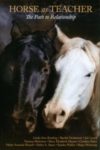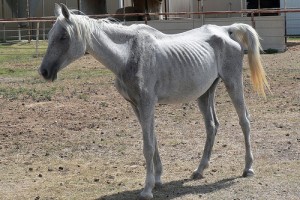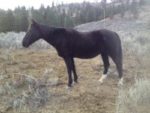The Skinny on Underweight Horses
Editors Note: This article was sourced from Riva’s Remedies.
Helping Horses Gain Weight
Horses acquire over 75% of their energy used for weight gain or for energy from fibre; not from protein, sugars or fats.
Fibre
- Ensure that the hay has enough digestible fibre: ADF (acid detergent fibre), NDF (neutral detergent fibre) and lignins refer to the cell wall portions of the grass which are not as digestible. Hay analyses for ADF should be less than 31% and the NDF less than 40%; the higher the values the more hay your horse has to consume to meet her energy requirements.
- Other beneficial sources of fibre include soaked beet pulp, cooked oats and wheat bran. Soak beet pulp in water (1 part beet pulp to 2-3 parts water) for several hours or overnight. Start with 2 cups daily. Purchase whole oats and cook just like you cook porridge. Let cool. Feed one to two cups daily. Beet pulp and cooked oats can be fed separately or together. Wheat bran – add ½ cup to the above mixture.
- Fibre is digested in the hindgut and relies on a healthy population of probiotics – i.e. friendly bacteria – to ferment it. Probiotics must often be supplemented to replenish adequate levels – always use probiotics which are refrigerated. Fermentation converts fibre from all feed sources to volatile fatty acids which are then used for energy.
Fibre Alternatives
- Adding alfalfa to the diet program is only useful if the horse is deficient in protein as may be indicated by a dropped top-line and/or a hay belly. Alfalfa supplements should be kept to a minimum – it is a supplement, not a staple.
- Do not feed grains such as uncooked oats, barley or corn to add more calories. These are high-glycemic foods which eventually cause leaky gut and Equine Metabolic Syndrome (EMS) which includes insulin resistance, EPSM, laminitis, and Cushing’s disease.
- Never feed concentrated fats or oils to add calories for weight gain. Vegetable oils, soybean oil, corn oil and safflower oil are unstable polyunsaturated oils which are a major cause of inflammation, liver congestion and free radical damage. And most of them are sourced from GMO crops. And remember, your horses do not have a gallbladder nor are they anatomically designed to ingest concentrated fats or oils.
- You may use ¼ cup daily of fresh crushed flax or chia seeds which are stored in a cool place. Seeds provide fibre and essential fatty acids – feed temporarily as needed but to avoid excess fat intake do not feed long-term.
- Many commercial feeds contain unhealthy ingredients however extruded feeds contain grains that have been processed with heat and pressure for high digestibility. Extruded feeds therefore, can be very beneficial for some horses (including senior horses) that are underweight, mal-nourished and/or have digestive/absorption problems. Use extruded feeds temporarily as long as necessary then discontinue.
Feeding Practices
- Always, always use slow feeders and never let your horses run out of food. Slow feeders provide a natural feeding environment whereby they can eat small amounts frequently without running out of food which is very stressful for them. Slow feeders help to regulate weight, control insulin levels and hunger, and also prevent boredom, stress, and digestive ailments.
- Slow feeders for underweight horses are intended to provide forage that is always available, not to slow them down as is the case with overweight horses. Therefore, underweight horses need to have “free” hay as well.
- Don’t frustrate your horses by hanging slow feeders which are too high, unsecured and/or swinging in the air or around a tree.
- Senior horses and horses without teeth will require soaked hay and/or soaked hay cubes but slow feeders are a healthy option for them as well.
- Don’t accept herd dynamics as an excuse for why horses on the bottom of the hierarchy aren’t getting enough food. It is the horse owner’s responsibility to ensure that every horse has convenient access to forage 24/7.
- Be aware of the underweight horse on grass. This horse may have Equine Metabolic Syndrome (EMS) and is a skinny diabetic, rather than an overweight insulin resistant one.
Exercise
- Horse owners are often reluctant to exercise under-weight horses feeling that they are too fragile. Exercise benefits all horses no matter the age, breed, health condition and/or body score. Exercise improves appetite, digestion, nutrient absorption, immunity and lowers stress levels. Adjust the exercise program to fit the health of the horse.
- Provide several different feeding stations by hanging slow feeders everywhere. This will encourage them to walk all day.
- Never keep horses in a stall or small paddock on a long-term basis. This is an unnatural, disease-causing, highly stressful existence for ALL horses; horses need freedom to move, friends and forage.
Stress
- Manage your horse’s stress levels. Stress alters a variety of metabolic hormones leading to increased weight loss.
- Some horses come out of winter a little on the lean side. This is not a concern and is in alignment with the metabolic rhythm of the wild horse bands.
- Be mindful of stomach symptoms such as heartburn, reflux and/or ulcers which will compromise digestion causing weight loss. And don’t use ulcer medications long-term – these depress hydrochloric acid (HCL) levels which is how horses digest their proteins. In addition, it can take a very long time for the HCL production to recover after the drugs have been discontinued.
Best Supplements & Remedies for Weight Gain
- Pro-Colon – ¼ tsp daily for 3-4 weeks; twice per year
- Probiotics to improve fibre digestion, nutrient absorption and immunity. Helps regulate weight. Prevents leaky gut.
- Vitamin B12 – 1-2 tsp (= 6,000 – 12,000 mcg)
- Stimulates appetite, supports digestion and detoxification and improves energy. Important nutrient for senior horses.
- Pro-Dygest – 2 Tbsp daily (bentonite clay, Irish moss, papaya leaf, slippery elm)
- Detoxifies and cleanses the intestinal tract encouraging optimum digestion and nutrient absorption.
- Performance+Plus – ¼ cup daily (chia seeds, ginseng, spirulina, oatstraw)
- Herbal blend to provide nutrition, proteins, minerals and fibre. Aids physical and nervous fatigue. Supports stamina, vitality and helps build muscle. Stimulates hoof growth.
- Red wine vinegar – 1 Tbsp – twice daily for one to two months at a time.
- Aids protein digestion, improves mineral absorption and helps regulate weight. Can relieve sore joints and arthritis.
- Slow Feeders – See link for more information.



